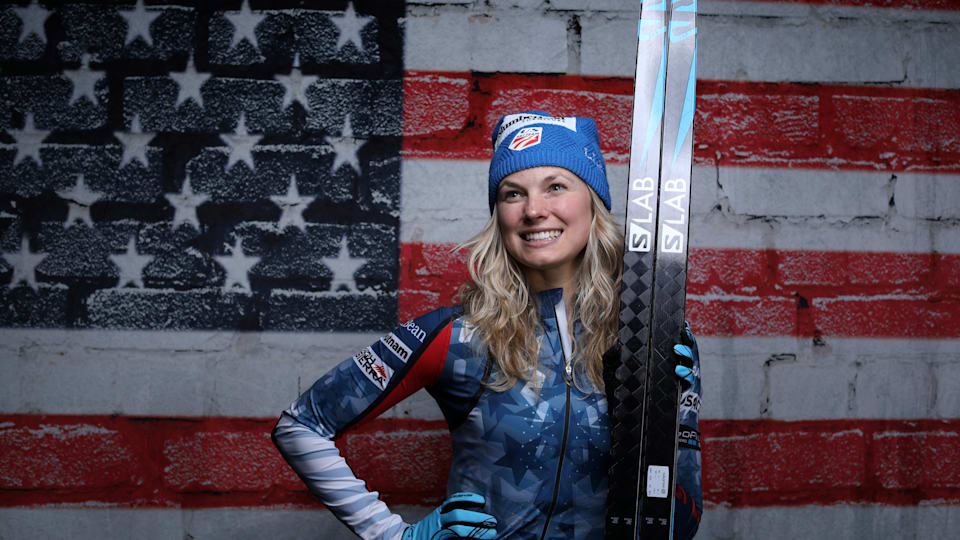Baseline happiness: How Olympic champion Jessie Diggins rebounds from setbacks
The USA cross-country skiing star reveals how she keeps her emotions in check, and why she has made mental health a priority ahead of her Winter Olympics title defence at Beijing 2022.

Jessie Diggins knows how to handle being knocked down, both in cross-country skiing and in life.
Take, for example, her most recent outing on the Tour de Ski in Val di Fiemme, Italy on Tuesday (4th January).
After winning two of the first three stages, the PyeongChang 2018 Olympic gold medallist crashed in Stage 4 when another skier obstructed her.
“I will never know how that could have gone,” the 30-year-old told journalists on a video press call organised by US Ski and Snowboard. “We don't have lanes. You don't have a protected space, and it sometimes it turns into a contact sport when people aren't playing by the rules very well, but that's part of ski racing.
“I was super proud of how I reacted and how I handled it. I didn't let it take my energy or take my focus. I think it could have been a day where you could have thrown a tantrum or whatever. But I was so proud of staying positive and staying focussed on what I could control.”
MORE: Five things to know about Jessie Diggins
MORE: Jessie Diggins - “The gold medal in my pocket helped my voice to grow even louder”
It was an uphill battle for Diggins in every sense of the word. The American was also competing with a head cold.
After checking twice that it wasn’t COVID, the team doctor cleared her to compete if she wanted. Diggins didn’t hesitate to take up the challenge and test her fortitude so close to the Beijing 2022 Winter Olympics in February.
“I think that was, for me, really interesting decision making, realising that it is possible to do things that are crazy hard and sometimes that's OK to challenge yourself and try anyway,” she continued.
“It definitely took all my energy and positivity and sheer willpower to simply be healthy enough to race and to make it to the finish line. So these last two days have taken every ounce of energy that I have, and it was actually one of the hardest things I've ever done, making it up that final climb today, and I’m so proud.”
How Diggins overcame an eating disorder
If Diggins seems experienced in overcoming adversity, she is.
The Minnesota native has been open about being diagnosed with bulimia as a teenager. As a perfectionist, she put huge pressure on herself in all areas of her life, and turned to an eating disorder in her last year of high school, an attempt to feel in control of her fast-paced life.
After she started suffering from chronic malnourishment, Diggins began a two-month intensive course of rehabilitation at the Emily Program. This rehabilitation, coupled to years of work and therapy helped her control the tendencies and prosper as an athlete.
Diggins eventually became an ambassador for the Emily Program, and wrote a book called “Brave Enough,” to help other people who have experienced the same problems and reduce stigma around eating disorders.
“I want to make sure that I can hopefully be a good role model to the next generation, inspire them to work hard and take good care of themselves and take good care of their mental health as well,” she said.
“The impetus for writing the book was to educate people about mental health and hopefully let it be an icebreaker. And I've had some really amazing, very touching feedback from people who have used my book to start the conversation with their coach or with their parents or as a coach, especially male coaches of young female athletes who say, ‘Wow, I really needed to read this to understand what it's like to be in the brain of someone who's recovered from an eating disorder’.”
It’s all about baseline happiness
Diggins partnered Kikkan Randall in the Team Sprint to win the USA’s first ever cross-country skiing Olympic gold medal at PyeongChang 2018.
This experience, coupled to her struggles with her physical health, led to a change in perspective on performance and life.
_“_I think when you're younger, every race seems to be like the best thing ever or the end of the world,” she continued. “But now that I've raced over two hundred and forty World Cups, I’m able to say, “OK, this happened. It was a bummer. But you know what? I'm going to learn what I can and move on.”
“As a person, my baseline happiness is in a really good place. You win a World Cup and your happiness bumps up for a few hours and then it settles right back into that baseline. And you have a day like what happened to me in the classic sprint during the tour. It goes down for like an hour and then it comes right back up the baseline.”
Diggins may not have been able to defend her Tour de Ski championship in 2022, but still has plenty to be happy about.
Aside from a head cold she is healthy, and her race fitness has been ramped up ahead of the Beijing 2022 Winter Olympics, where she is expected to compete for a multitude of medals.
